DONETSK -- "Good evening, ladies and gentlemen. Welcome to our concert!"
It was 6:34 p.m. when the staccato of mortar fire rounds began, and Alexandr, a 33-year-old Ukrainian soldier who goes by the nom de guerre "Grom" (Thunder), and his joke invited everyone inside. In Zenit, a Ukrainian army position on the front line with a direct view of the Donetsk airport two kilometers away, soldiers get concerts in their hometown every single day. We were the first to embed with the unit in Zenit, a team of two Romanian journalists. Out of the eight middle August days with the Ukrainian army, we spent four with the soldiers in Zenit. Unlike Pisky or Avdiivka, two other hot spots on the Ukrainian front line close to the Donetsk airport -- whose ruins, given the months of sustained battles, are fought over by both sides -- Zenit is not the name of a town. It is the military name of this strong defense position. It used to be the point of the anti-aircraft defense system of the Donetsk airport. The soldiers here have the task of holding the position and don't retreat.
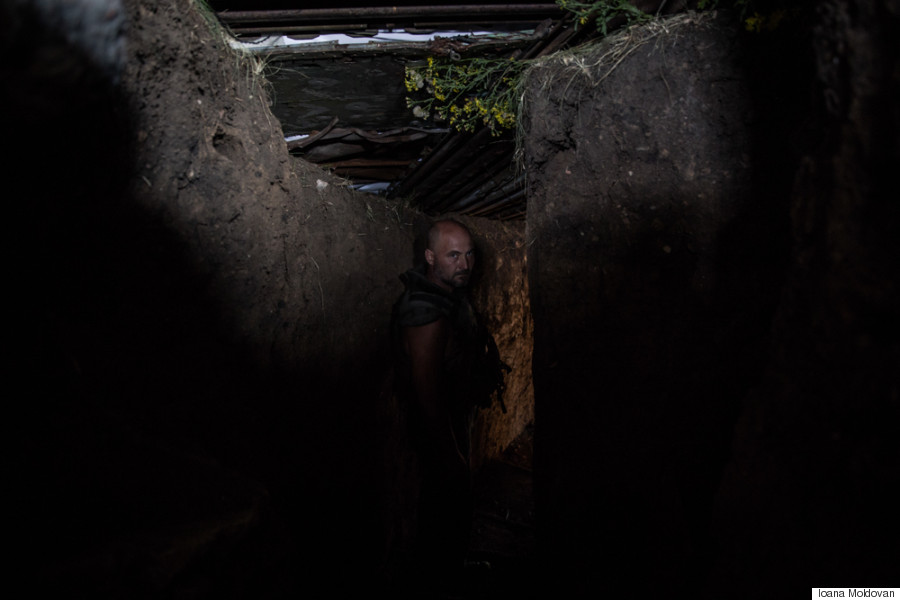
I don't know how the landscape around Zenit looked back when the military position was first established, but these days it surely resembles the set of an apocalypse movie. Only this is real, not cardboard-made. The few standing buildings look like a poorly played Tetris game, with huge holes between their bricks. The fields like an old junkyard with rusty damaged armored vehicles and car skeletons. The ground appears like it came down with a bad case of chickenpox, all littered with craters from Grad missiles and mortar rounds. The trees have no branches, their arms amputated by shrapnel.
"They (the separatists) were firing all sorts at us," said Sergey, nom de guerre "Student," a 25-year-old from Sverdlovsk, Luhansk Oblast who had his first encounter with war one month ago. "When I went outside, I did not see any object around us anymore. It was scary."
"These men are hard guys, they don't have fears," Grom adds.
Even so, whenever Sergey needs a bit of extra strength and spirit, he looks at the photo of his 4-year-old son on his cell phone. That's his lucky charm. That's his stamina.
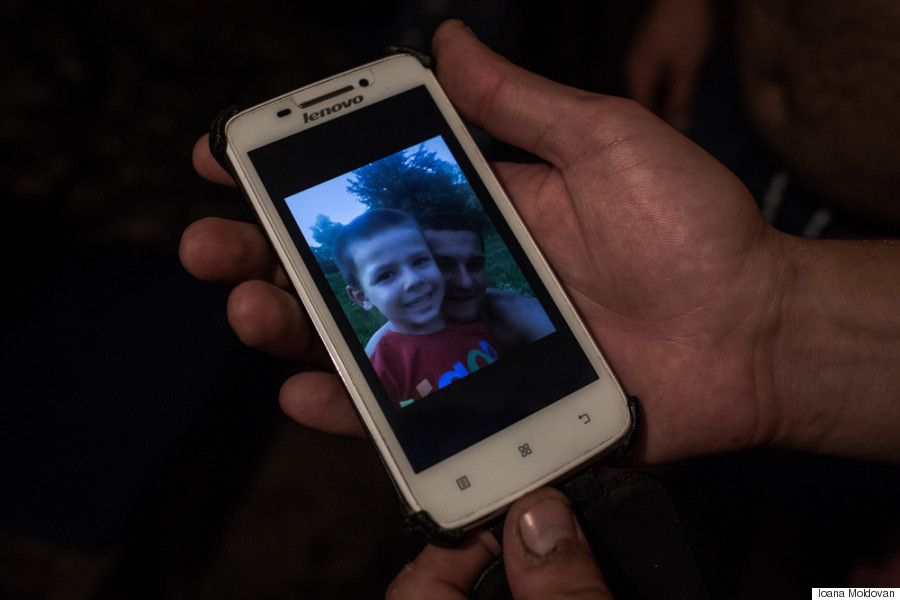
His parents back home in Luhansk think he is the enemy. They call him "banderivets" -- a term originally used for the supporters of Stepan Bandera, one of the Organization of Ukrainian Nationalists leaders that nowadays pejoratively describes a thug and an enemy of the Soviet regime -- or "ukrop" -- a term that literally means dill in Russian, but has been used by separatists as a derogatory term for Ukrainians. He laughs when they call him all these bad names. He has not spoken to his father, a former miner and the most pro-separatist in the family, in over eight months. But he can always take another look at Ivan's photo on his cell phone, who is with his pro-Ukrainian wife.
They all came here to defend their country. Nothing else matters.
* * *The two faces of aid
The sun went down with a bang, but it came up silently. Early mornings are the quietest time of the day in Zenit. Soldiers wake up to yet another day on the front line. They eat their breakfast, thank Ruslan the soldier-cook on the way to throwing away the plastic plates and then relax for a few minutes while smoking a cigarette. Most of the soldiers in Zenit smoke. You can tell who was on guard duty the previous night by the brand on the pack of cigarettes that lies on top in the trash bin.
"Do you know why soldiers in the army have to wake up at six in the morning?" Grom asks.
"Because at that hour you feel like killing everyone." Laughter breaks the morning silence.
Grom is among the few soldiers who speaks English. When it comes to more complicated things to say and gestures aren't enough, Google Translate can become a valuable asset. It is even used by communication officers for translating unknown words from some Russian messages they intercepted.
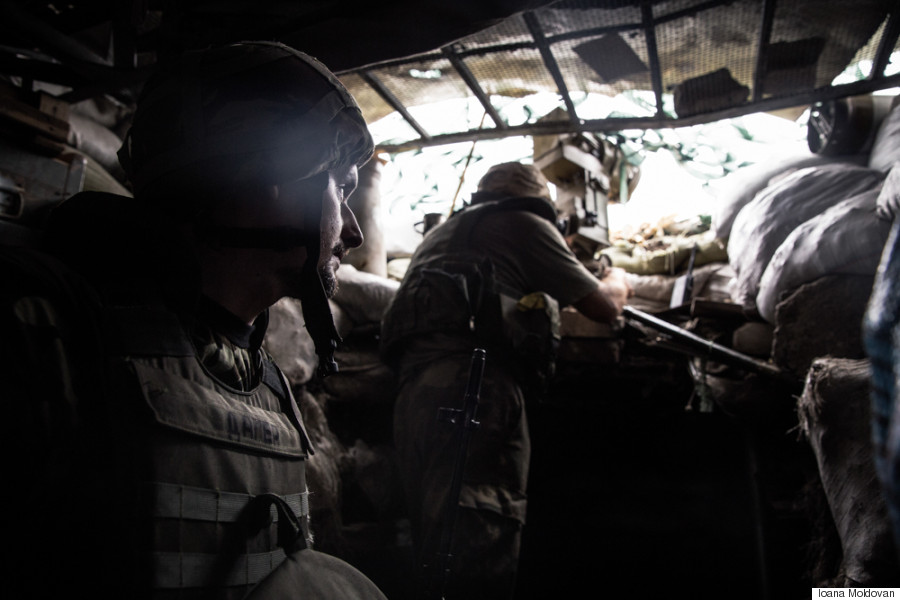
Some hundreds of meters away, in a forward post, Morgan, short for Morganiuk, prepares his instant coffee. He is a 35-year-old lieutenant colonel from Lviv, a scout and the post commander. Not many commanders stay in forward positions where it is more dangerous, but this is where he spends most of his time. His shrapnel-torn bulletproof vest lies aside in the improvised terrace where a wooden sign with "Lucky Cafe Bar" written on it hangs. "Welcome to my house," he says with a big smile on his sunburnt face. He lived through four Grad rocket explosions. As he talks about the war, he shows pictures of himself back home, from when he was a "Lviv Titushka" (bad boy), as he likes to joke. On his wrist he wears a rubber bracelet with Ukraine's colors, a present his 7-year-old son had given him when it was time to go to war.The day before, he saw white trucks coming into Donetsk airport area. It's the Russian humanitarian convoy, though "humanitarian" does not sound right to Morgan.
"You know, Ukraine does not control the border," Morgan says. "So, welcome, Grad, welcome, troops, welcome, patron (bullets)!" Every time the convoy comes, the next day is more silent, but the following one comes with heavy shelling.
"This is no civil war," Konstantin Bernatovich aka "Koha" says. "It is a war between two countries, Russia and Ukraine. And it is bad for Ukraine. Good patriots die protecting their homeland."
He is a 33-year-old from Kiev, father of twins aged 13, former TV cameraman and photographer, who volunteered in the army about five months ago, in March 2015.
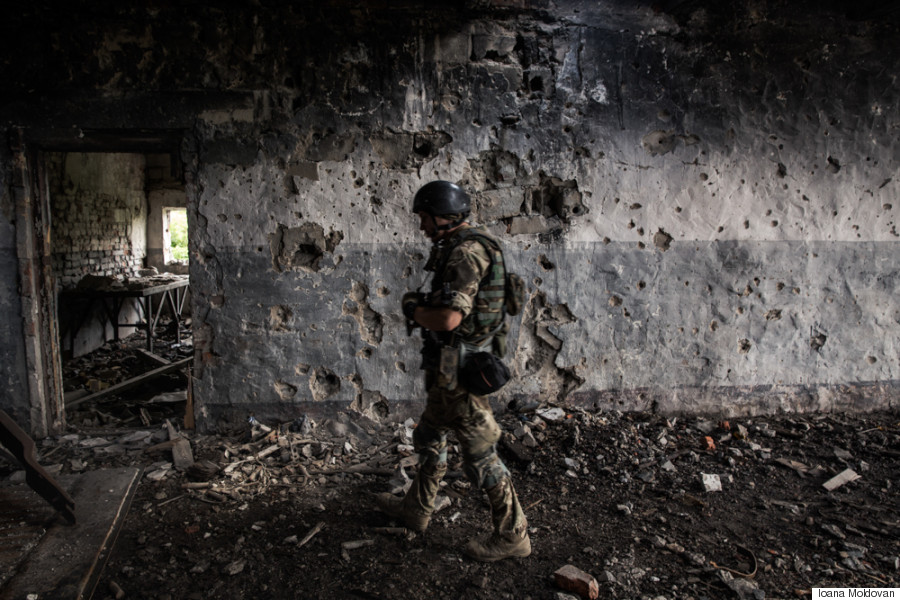
Koha says his wife was very worried when he decided to go to war. But she helped him a lot. "This is from my wife" he says repeatedly as he points to his boots, his trousers, his bulletproof vest, his fleece blouse. The military is not prepared to equip every soldier with all they need in times of war. Sometimes soldiers get only their weapon and ammunition from the army, having to ensure the necessary equipment on their own. Soldiers' uniforms are so diverse that you don't see two alike from head to toe.
We are "minimalna" (minimally) equipped, says Eduard Zuzin, or "Taiga," the Siberia born and raised commander of Zenit, with a sour smile.
This war has caught Ukraine by surprise, as it did the rest of the world. A country that is already confronted with economic recession cannot afford the high cost of a modern war. It's as if a family barely affording rent would suddenly need to buy a gun to protect their home.
This is where the volunteers come in. The volunteers' movement in Ukraine is of very high importance, even to the very survival of the servicemen. And soldiers on the front really count on them. Volunteers raise money using social networks to buy military equipment, clothes, food supplies and even war needed medicines. Most of them are Ukrainians, but they also get help from the relatives and their friends living in Europe, the U.S. or Canada. When the van bringing packages comes to Zenit it's like Christmas time. Soldiers gather around it like children around the Christmas tree, all waiting in excitement to see what they are to receive. A 6-pack of Coca-Cola bottles brings momentary joy to a young soldier. But, like in a year-long holiday spirit, they all share what they've got. There is no individual here, it is only one big family. A real band of brothers. The strings that unite them are those which can only be formed in combat and can only be truly understood by those who live through it.
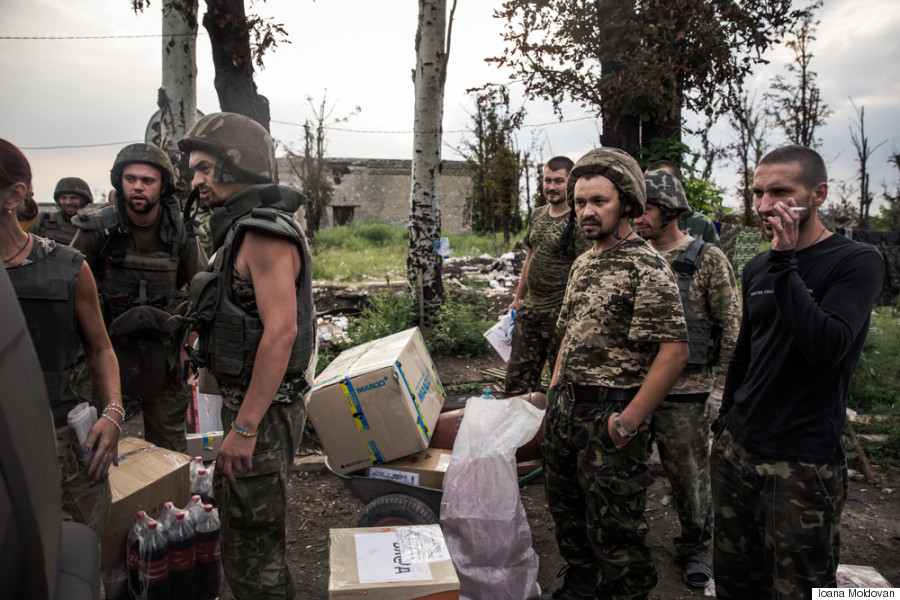
* * *A sham sense of safety
The front cover of the newspaper Fanyi Novyny(Fine News) that came with the packages reads in bold letters "Donbass is Ukraine." Soldiers gather in the little smoking area -- bulletproofed by steel boards -- in front of the main post, and read the news. Vasili, a witty young soldier, starts "rapping" from an article. It brings laughter to the group. If there is something the soldiers don't lack, apart from courage and patriotism, it is a keen sense of humor and the ability to smile and laugh even under the toughest of conditions.
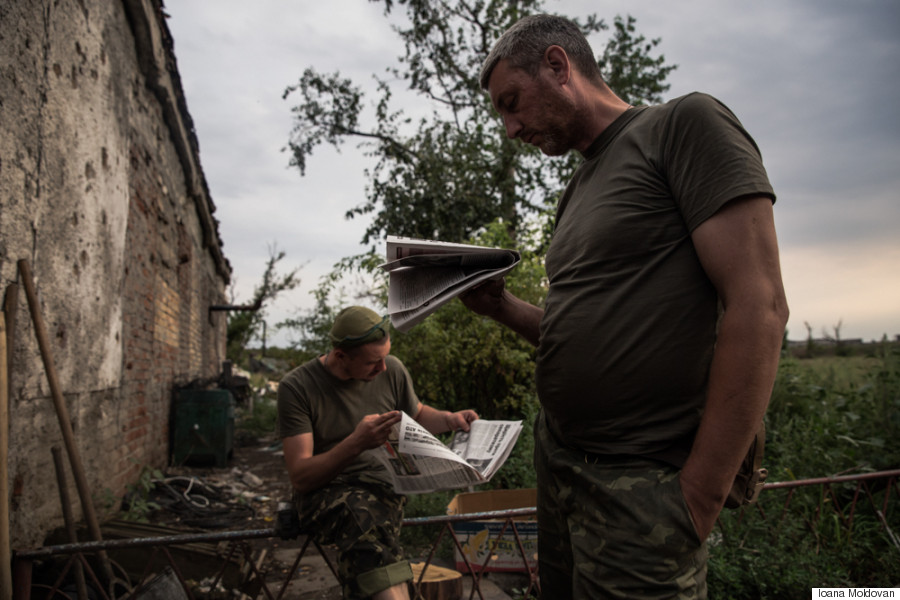
One other evening, two soldiers were approaching an open field from a destroyed building used as passage to some of the other forward posts. One of the guys sitting outside smoking started to imitate the hiss of a Grad missile. "Grad! Grad!" another said and all burst into laughter.
Most of the times, it is Vasili who puts on a show. Head constantly covered in a military bandana, he always makes funny faces and voices when he tells a tale or a joke. He could be an actor. Or a rock star.
"Big gun / Big gun number one / Big gun, got a hot one / Big gun, got a number one" the player on a mobile phone yells the AC/DC song as he guitar-plays his Kalashnikov. "Big gun, give it, give it a shot, c'mon." And the big gun does not wait for a second invitation. A powerful blast nearby interrupts Vasili's solo.
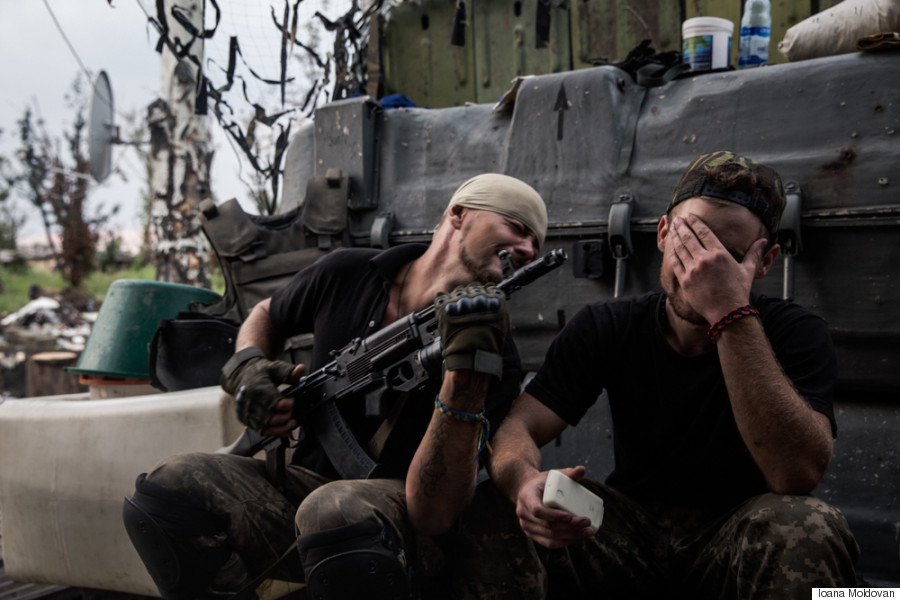
One moment the couch is hosting soldiers watching a TV show. Two minutes later it is the scene of commotion involving blood, bandages and medics. And a Ukrainian soldier with a head injury. A direct mortar hit destroyed his underground den, his "nora" as the soldiers call it.The commander is holding a big flashlight over them while medics clean his wound. They strip him naked to check every other centimeter of his body for injuries. The soldiers gathered around watch silently. The torn skin on his head looks like crepe paper coming off with each gauze wipe. They bandage him again to take him to the hospital. The nearest one is some 30 kilometers away, in Krasnoarmiisk. Doctors have to ride in the night, no headlights, on roads that are constantly under fire.
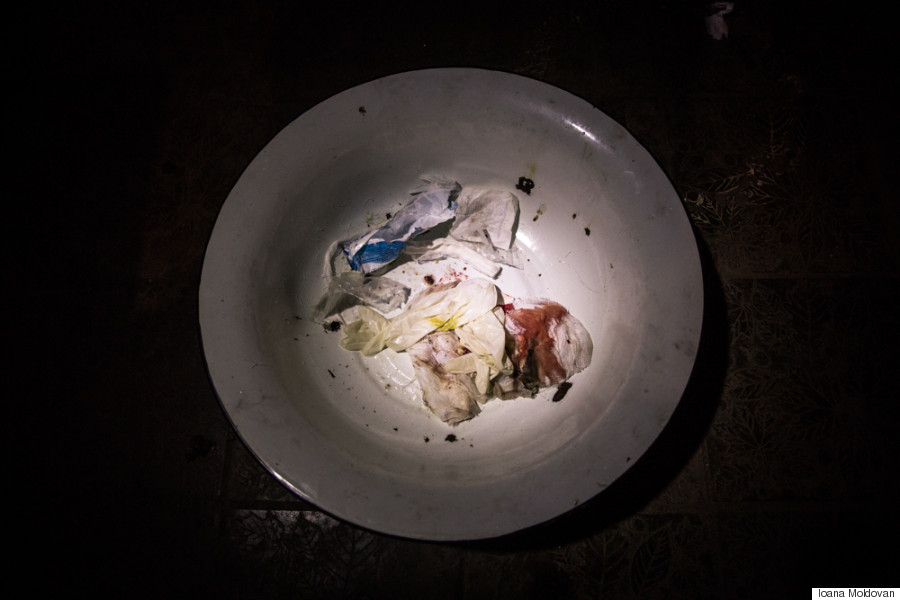
Seeing a fellow soldier wounded does not bode lightly on the men of Zenit. Their faces look grimmer now and the occasional joke does not have the usual effect. As soldiers chat and smoke, the muffled sound of blasts outside can still be heard below. It is funny though how one gets accustomed to almost anything. The first three or four blast sounds made me startle, but then they somehow just become background noise. It's just like the commander said, "people are like animals, they can adapt to everything. We are the universal animal."
Grom takes out another cigarette. The 33-year-old from Vasylkiv, Kiev Oblast is one of the two sappers of the Zenit unit. The soldiers in Zenit come from different types of armed forces, including airborne. Grom worked as a military psychologist in Marinka back in Nov. 2014 when their positions were attacked. He was really afraid. He remembers calling his family before the fighting began and saying his goodbyes. The 50 Ukrainian soldiers in that position expected that the much more numerous separatist forces will kill them all. When he and his comrades counterattacked, he killed his first human being.
"I did not feel anything, I could not think of anything," Grom confesses. They called the artillery for help and they survived. Grom called back his family and said, "I'm alive and fine!" They cried.
The commander in Zenit has not lost a single man. None of the over 100 soldiers under his command. Neither in Zenit, since they arrived late July, nor in the war. The 50-year -old colonel is at his first war. And he bluntly calls it "a mistake." For somebody who has been in the military since 1982, Aug. 5 -- he recalls all the dates perfectly -- Zuzin has rather pacifist beliefs. He thinks armies are there, in each country, with the sole purpose to defend and protect, not to go and kill other people. Nevertheless, he does think of all the separatists as terrorists, no matter their nation, no matter their religion, and the first thing that he wants the world to know and remember is that the Russian Federation invaded Ukraine.
The idea behind Zuzin's message to the world is shared by all the soldiers I've talked to. They don't believe they are fighting brother Ukrainians, but Russian troops and mercenaries, sponsored by Russian money. And those keep coming with the white trucks Morgan saw.
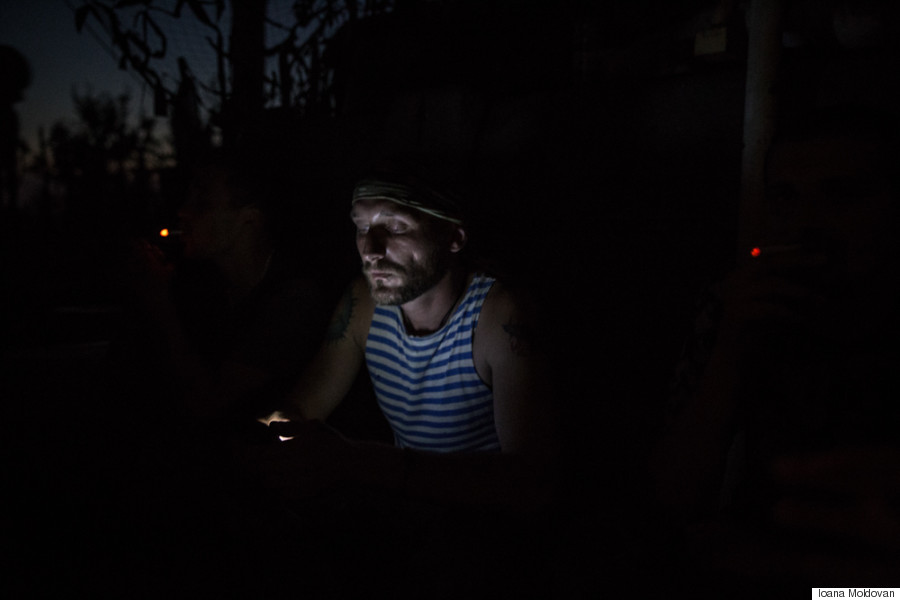
Morgan's prediction came true. The evening after I left Zenit, at 7:18 p.m., Grom sent me a message: "Peace has ended. Separatists have started shooting mines." That makes the white trucks the deadliest "humanitarian" convoys ever.
Last week, after months of continued ceasefire violations, Ukraine and pro-Russian separatists agreed to strive for an end to all truce violations starting Sept. 1, the day kids are going back to school. Yesterday evening I wrote a message to Koha, asking him what the reality on the ground looks like. At 9:52 p.m. Ukrainian time he replied, "Silence, nobody shoots." At least there was one night without concerts on the front line.
Earlier on WorldPost:
